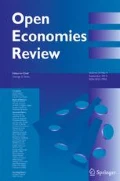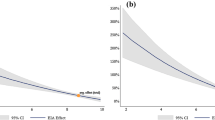Abstract
Transaction costs in trade gravity equation are proxied by the distance that separates two trading partners, under the assumption that the distance elasticity is the same across all trading partners. We show that distance elasticity, however, critically depends on whether trading partners are industrial countries (i.e., members of the OECD) or share same religion. These heterogeneities are both statistically and economically significant. For instance, expected trade flows are the largest when an OECD member trades with a non-member and both are non-religious. Expected trade flows fall as much as by 62.9% between two non-religious, non-OECD members. Expected bilateral trade drops by 48.1% when both countries in the pair are OECD members while one is Christian and the other is Islamic. Both religion and OECD membership significantly affect the typical transaction costs implied by the gravity equation.
Similar content being viewed by others
References
Anderson, James E. (1979) “A Theoretical Foundation for the Gravity Equation.” American Economic Review 69:106–115.
CIA Factbook, http://www.cia.gov/cia/publications/factbook.
Deardorff, Alan V. (1998) “Determinants of Bilateral Trade: Does Gravity Work in a Neoclassical World?” In Jeffrey A. Frankel (ed.), The Regionalization of the World Economy. Chicago: University of Chicago Press (for NBER).
Frankel, Jeffrey A. (1997) “Regional Trading Blocs in the World Economic System.” Institute for International Economics Washington, DC.
Fratianni, Michele and Heejoon Kang (2006) “Heterogeneous Distance-Elasticities in Trade Gravity Models.” Economics Letters pp. 68–71.
Huntington, Samuel P. (1993) “The Clash of Civilizations.” Foreign Affairs 72:22–50.
Landes, David S. (1998) The Wealth and Poverty of Nations: Why Some Countries are so Rich and Some so Poor. W.W. Norton.
Rose, Andrew K. (2000) “One Money, One Market: The Effects of Common Currency on Trade.” Economic Policy 30:9–45.
Rose, Andrew K. (2003) Which International Institutions Promote International Trade? Manuscript. University of California at Berkeley.
Weber, Max (1930) The Protestant Ethic and the Spirit of Capitalism. Allen & Unwin.
World Christian Database, http://www.worldchristiandatabase.org/ecd.
Author information
Authors and Affiliations
Corresponding author
Additional information
JEL Classification Number: F13
Rights and permissions
About this article
Cite this article
Kang, H., Fratianni, M. International Trade, OECD Membership, and Religion. Open Econ Rev 17, 493–508 (2006). https://doi.org/10.1007/s11079-006-0361-y
Issue Date:
DOI: https://doi.org/10.1007/s11079-006-0361-y




